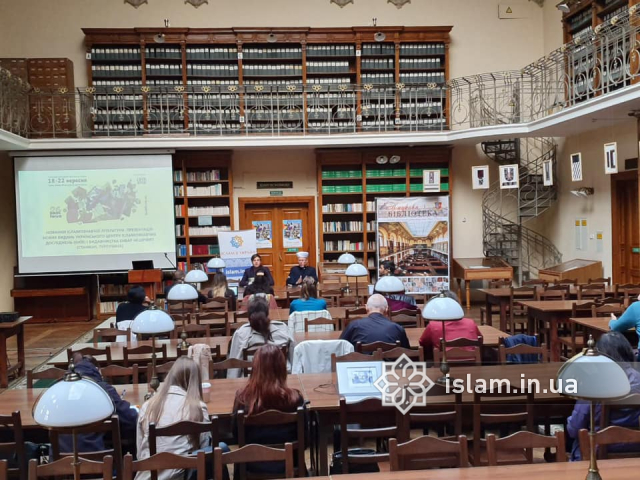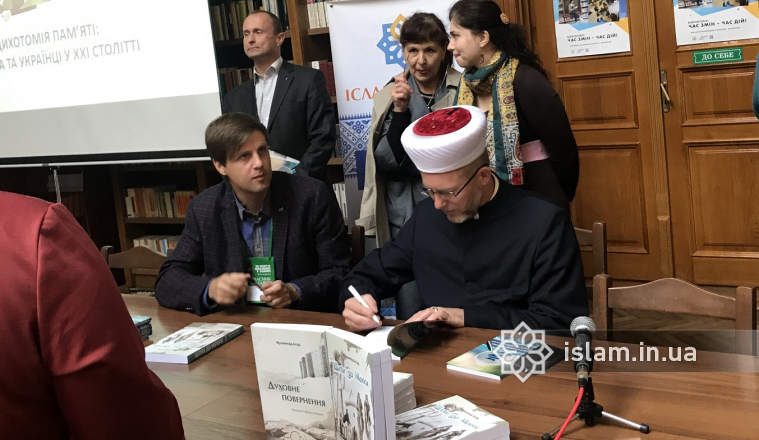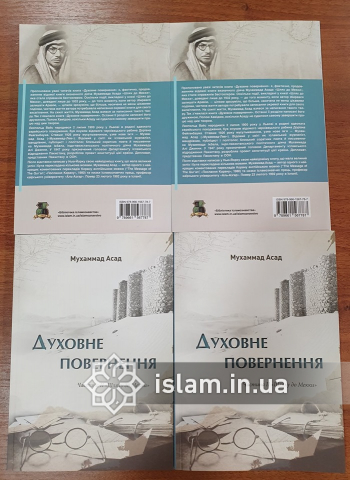On Friday, September 20, 2019, during new publications presentation, held by Ukrainian Center for Islamic Studies, Sheikh Said Ismagilov, the RAMU Ummah Mufti, the head of the Ukrainian Center for Islamic Studies, and Mykhailo Yakubovych, a well-known scholar, specialist in religions and oriental studies, associate professor of the Ostroh Academy National University, presented Muhammad Assad’s book called Spiritual Return, translated into Ukrainian. This presentation was held as part of 26th BookForum the international book festival.
2018 year seems to be the most important among the years of studying Muhammad Assad’s heritage in Ukraine. That year the Ukrainian reader could read the first part of this book, entitled “The Way to Mecca”.
And finally, we have an opportunity to read its second part — Spiritual Returns. It is Muhammad Assad’s memoirs, which are about the further fate of the thinker, writer, preacher and politician.
As Mykhailo Yakubovych notes, Spiritual Return is the result of Muhammad Asad’s works.
“Those who read the first part of the book felt the romantic spirit of every page; neophyte jealousy, deep reflection, attempt to see the East of that time when rapid modernisation had just started. Muhammad Asad completed the first part of his memoirs in the fifties and was writing the second part in the eighties. To a certain extent, this was the result of the author’s works, which appeared after the translation of the Quranic interpretations (“The Message of the Quran”, 1980) had been published,” — notes Mykhailo Yakubovych.
According to the scientist, " this book is special not only because it was written later on the author’s own time, but also with a significant contrast between that global world of pre-war times, and the world after the Second World War, and, especially, in the height of the cold war. "
“In some parts, Muhammad Asad mentioned his native town - lviv. For example, when the author writes about the events, held in the forties, and his discussion with the head of the internment camp, who tried to blame the author for a certain “leftism”, recalling his small homeland, “[...] Now Lviv is incorporated into Russia; this fact should please you, right? "- , He clumsily hinted in such way that my sympathies belonged to communism. This flat remark made me angry, and I acutely answered: "That please me like the Prague occupation by Germans please you, Mr. Viskochil! [...]". Or in the context of talking with British officer: “Regarding the fact I was born and grew up in the Polish-speaking Lviv (in fact, my mother tongue was Polish), I could understand a little the Russian language related with it, although I hardly spoke in it."
At that time of certain disorientation in the Muslim world, Muhammad Asad understood the threat of both Nazism and communism, reasonably believing that the victory of both would put an end to the Muslim world hopes for independence from colonialism. The author was in fact neither left, nor right, nor Islamist (in the sense in which this word is used now) - rather, a convinced fighter for freedom, who had a far seeing vision of the world. Further, we see how consciously Muhammad Asad was at the sharp end of increasingly complicated relations in the Muslim world, especially after he had been forced to quit political stage as the representative of Pakistan at the UN. Against the backdrop of the Arab-Israeli confrontation, Muhammad Assad had to "fight back" from both parties engaged in that conflict; and he did it very successfully, defending his good name. The same line is felt in the memoirs of Assad’s wife, Poli Hamid Asad, in which Muhammad Asad appears not only as an observer, but also as a participant of all events: political meetings, scientific research, personal travels, etc., ” — says Yakubovych.
The scholar hopes that the second, final part of Muhammad Asad’s memoirs, which was released due to the translator Yuri Kosenko and the publishing house Ukrainian Center for Islamic Studies, will be as interesting for readers as the first one.
It should be noted that two books (Muhammad Asad’s Spiritual Return and Yakubovych’s research “Islam in Eastern Europe: the traditional moderation) were presented in the reading room of the scientific library at the Ivan Franko National University at the same time and it’s not by chance, because Muhammad Asad saw the idea of moderation as a fundamental concept.
During the presentation, Mykhailo Yakubovych noted: “In his (Muhammad Asad - ed.) interpretations of Quran, in his works on Islamic law, we constantly see the idea that Islamic moderation is one of the basic principles of Islam.”




